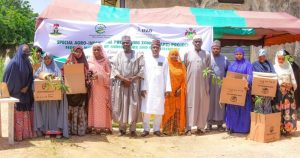
The Special Agro-Industrial Processing Zones (SAPZ) Programme, under the International Fund for Agricultural Development (IFAD), has launched the distribution of home gardening toolkits to 1,445 households across eight local government areas in Kano State.
The initiative, which is part of the SAPZ Targeted Nutrition Support Programme, is aimed at enhancing food security, promoting nutrition, and empowering vulnerable groups, especially women, to cultivate nutrient-rich vegetables and crops within their homes.
Speaking during the official launch of the programme in Kano, the State Project Coordinator (SPC) of SAPZ, Mr. Aminu Iliyasu, said the intervention was designed to promote household self-sufficiency, improve dietary diversity, and reduce dependence on external food sources.
He listed the benefiting local government areas as Kura, Garun-Mallam, Bebeji, Dambatta, Gezawa, Dawakin Tofa, Bichi, and Bagwai.
Iliyasu explained that the toolkits would provide families with basic gardening tools and inputs suited to their local environment, allowing them to cultivate a variety of vegetables and small-scale crops.
He said the initiative would help households cut food expenses, earn income from the sale of surplus produce, and strengthen their economic resilience against food price fluctuations and shortages.
In his remarks, the Kano State Commissioner for Agriculture and Natural Resources, Dr. Danjuma Mahmoud, described the initiative as a significant step towards transforming agriculture from subsistence to a tool for empowerment and rural development.
Represented by the Permanent Secretary of the ministry, Alhaji Bashir Sanusi, the commissioner commended SAPZ for its focus on women and youth, noting that the programme aligns with the state government’s agricultural transformation agenda.
Mahmoud highlighted other complementary initiatives by the administration of Governor Abba Kabir Yusuf, including livestock distribution to women and youth, deployment of mechanized farming equipment, and recruitment of over 1,000 young agricultural extension workers.
The SAPZ initiative is being implemented in collaboration with the Federal Government of Nigeria, the Islamic Development Bank (IsDB), IFAD, state governments, private sector partners, and local communities.
The programme is expected to increase the production of nutrient-rich vegetables at the household level, reduce malnutrition, and stimulate local economies through the procurement of materials from local suppliers.





